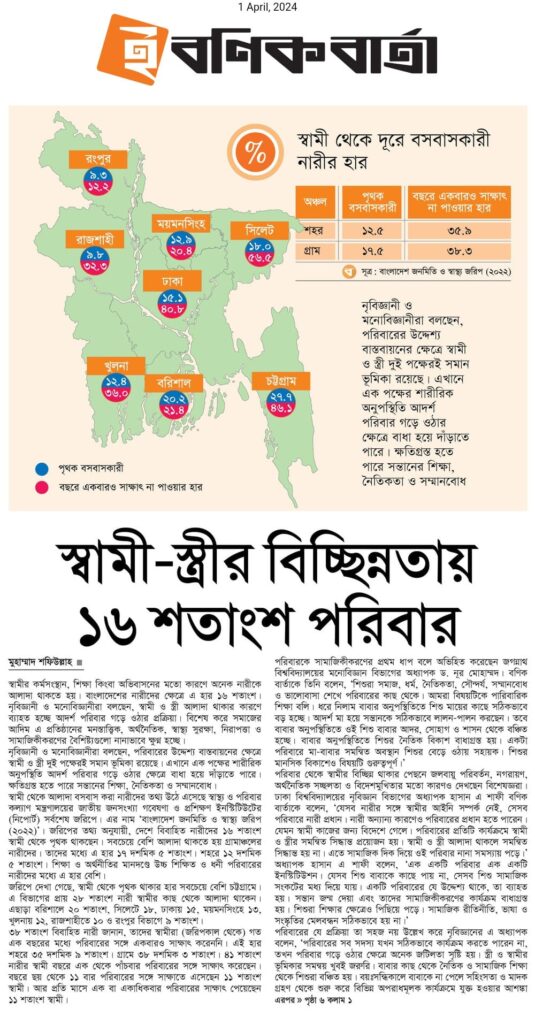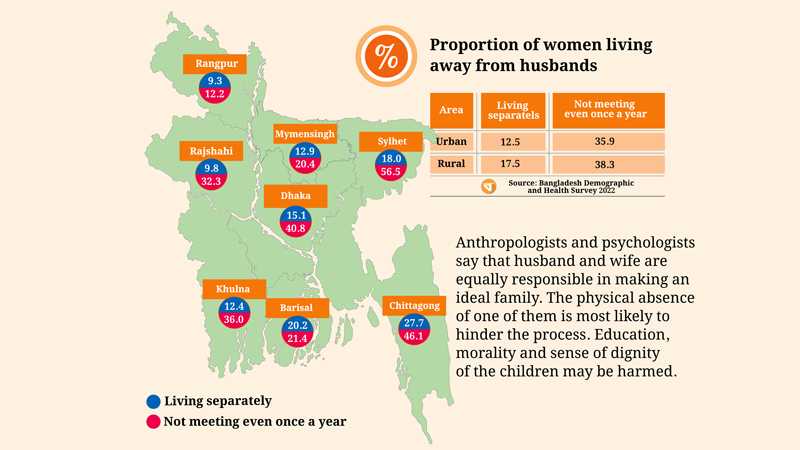Many women have to live away from their husbands due to different reasons like employment, education or migration. And, in Bangladesh, a good 16 percent of all married women do that. According to anthropologists and psychologists, the process of formation of ideal families is hindered due to this parting, negatively affecting the psychological, economic, social, security and health characteristics of the most primitive institution.

Anthropologists and psychologists say that husband and wife are equally responsible in making an ideal family. The physical absence of one of them is most likely to hinder the process. Education, morality and sense of dignity of the children may be harmed.
The information on women living separately was revealed in a survey titled ‘Bangladesh Demographic and Health Survey (2022)’. National Institute of Population Research and Training (NIPORT) of the Ministry of Health and Family Welfare conducted the survey, which is the latest. According to the survey, 16 percent of currently married women have husbands who live overseas or elsewhere within Bangladesh. Married women in rural areas, better educated women and women from wealthier households are more likely to have husbands living elsewhere. The percentage in case women living in rural areas stands at 17.5 percent while it is 12.5 percent in urban areas.
The survey shows that Chittagong division has the highest rate (28 percent) among the women living without husbands, followed by 20 percent in Barisal, 18 percent in Sylhet, 15 percent in Dhaka, 13 percent in Mymensingh, 12 percent in Khulna, 10 percent in Rajshahi and 9 percent in Rangpur.
Thirty eight percent of women whose husbands live elsewhere had no visits from their husbands in the 12 months preceding the survey. This proportion is 35.9 percent in urban areas and 38.3 percent in rural areas. Husbands of 41 percent women met their families one to five times in a year. Eleven percent did so six to eleven times in a year. And, 11 percent of the husbands met their family once or more every month.
Professor Dr Noor Muhammad of Psychology Department of Jagannath University refers family as the first step of socialization. “Children learn about society, religion, morality, sense of dignity and love from family. We call it family education. Absence of father deprives children of his love, care and guidance. The presence of both mother and father is important for the psychological growth of children,” he told Bonik Barta.
Experts attribute the absence of a man from the family to issues like climate change, urbanization, financial solvency and desire to go abroad. Professor of Anthropology at Dhaka University Hasan A Shafie told Bonik Barta, “A coordinated decision by both husband and wife is needed for all the family activities. It is not possible if husband and wife live separately. This type of families tend to face different social problems,” he told Bonik Barta.
“Each family is an institution. Children who do not get father go through different social problems. The absence of a father questions the objectives of a family,” he added.
As the families in Bangladesh are dominated by men, the health of other members is affected due to the absence of the husbands. Public health experts say that long-term and non-infectious diseases have gone up in the country. The treatment for some of the diseases is long-term. And, the head of a family has an important role to play.
Experts also say that women sometimes suffer from diseases that are not curable. Their treatment gets delayed due to absence of their husbands. Children also suffer for longer period due to absence of their fathers.
“Men and women have to live separately as society has changed. The state and society will have to come forward to face this crisis. But, we do not see that in our country. The issue of migration is creating more challenges,” Dhaka University Professor and Chair of Refugee and Migratory Movements Research Unit Dr Tasneem Siddiqui told Bonik Barta.

